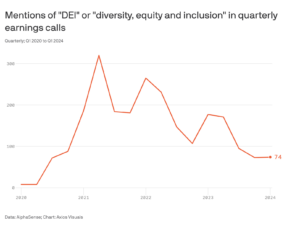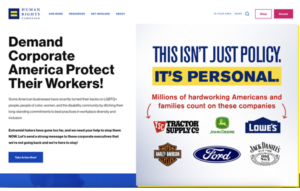The Shifting Landscape of Corporate DEI and What It Means for Your Business
By: Diana Muggeridge, Senior Director, Strategic Planning
Companies are rethinking their DEI platforms under pressure from both sides, driven by activists like Robby Starbuck. Today, we explore what it means and how to navigate it.
What We See:

It’s not easy for companies to navigate their role in societal issues, and the shift in activity around diversity, equity, and inclusion (DEI) proves it. These decisions not only shape corporate reputation but can also have an impact on enterprise value.
“To be silent is to be complicit.” Netflix
“Stands in solidarity with you.” Reebok
“Neither love nor terror makes one blind: indifference makes one blind.” HBO
“Believe in something, even if it means sacrificing everything.” Nike
These are excerpts from company statements made a mere few years ago in response to the Black Lives Matter movement that was accelerated by the murder of George Floyd. At the time, companies were facing heavy business and reputation pressure from employees and societal influencers to speak out against racially driven police brutality.
And the statements fall in stark contrast to those being released this summer from other Fortune 500 communications departments.
“Going forward, we will ensure our activities and giving tie directly to our business.” Tractor Supply
“As you know, over the past few years, we have been narrowing our community and philanthropic areas of focus to strategically align with our business.” Harley Davidson
“We launched our diversity and inclusion strategy in 2019. Since then, the world has evolved, our business has changed, and the legal and external landscape has shifted dramatically, particularly within the United States. With these new dynamics at play, we must adjust our work to ensure it continues to drive business results while appropriately recognizing the current environment in which we find ourselves.” Brown-Forman
“We are mindful that our employees and our customers hold a wide range of beliefs, and that the external and legal environment related to political and social issues continues to evolve.” Ford
These latest notes were prompted by pressures from right-wing activist Robby Starbuck, who has waged an online campaign calling on companies to dial back their engagement in DEI. He has targeted companies with primarily conservative customer bases, spotlighted their apparent “woke” policies, and called for boycotts unless they change.
Purple Strategies’ digital media analysis shows there have been roughly 6,500 news articles and more than 1.2 million social media posts around this issue since June, proving Starbuck’s efforts have been effective at generating some public interest. While still substantial, rampant online bots appear to be inflating the conversation on social media and data show this issue is still more connected to the right than being mainstream
- 37% of the informed public claim awareness of companies’ actions towalk back DEI policies, driven primarily by Republicans (43%) compared to Democrats (35%) and Independents (23%).
- 50% of the top 20 publications reporting on the topic are from right-leaning publications like Daily Truth Report and Breitbart.
- 60% of the top 20 social posts with the most engagement came from right-leaning voices like DC Draino and Fox News.
What It Means:

The recent wave of anti-DEI activism, particularly from the right, signals that companies must recognize a new and expanding fault line in societal and political issues. This isn’t just a Robby Starbuck problem; it reflects a broader shift in how companies manage reputation, as both sides of the political spectrum now actively scrutinize corporate values and actions.
“In general, there is permission to push back now publicly and privately because of the high-profile cases … They have given us permission toretreat [on DE&I].” Head of Communications, Fortune 500 Healthcare Company, Purple Strategies Executive Interview

This is new terrain for many companies. Unlike traditional crises like recalls, where established playbooks exist, the societal and political pressures around DEI are fluid and unfamiliar. Companies are navigating a landscape where almost any action can ignite backlash from either side, impacting both enterprise value and reputation in unpredictable ways.
That’s all to say while Starbuck doesn’t fully represent the corporate world’s DEI problem, he has thrown gasoline on it.
Advocates of DEI aren’t taking these actions sitting down, and their pushback on Starbuck and retreating companies is gaining momentum. The Human Rights Campaign—one of the biggest targets in Starbuck’s crosshairs—has come out swinging against companies who have walked back their policies.

And other influential voices are also starting to more directly challenge the anti-DEI push.
“Activist investors are weighing how to push back on at least seven public companies that have cut diversity programs targeted by Starbuck, who initiated an online campaign earlier this summer seeking to prove DEI has no place in business operations.” Bloomberg
“Far right actors [ ] are attempting to bully corporate America [to back away from DEI policies].” Rep. Steven Horsford, D-Nev., chair of the Congressional Black Caucus
All of this activity is against the backdrop of the informed public, who are relatively split around their beliefs toward corporate DEI initiatives: 56% believe companies should continue prioritizing it as part of their strategy while 44% believe it’s gone too far, according to September Purple Strategies polling. But deep partisan splits further complicate companies’ path to managing this issue, with 80% of Democrats supporting corporate DEI initiatives and just 33% of Republicans feeling the same.
What To Do About It:

Companies find themselves needing to perform a balancing act, weighing the needs of a wide range of stakeholders. If targeted, no or insufficient response will intensify boycott pressure while any corrections will generate their own aftershocks.
And it’s not just companies with overtly conservative customer bases that need to pay mind, now that Starbuck has proven his model with companies with more moderate and diverse customers of the likes of Ford and Lowe’s. Every major company should be preparing for pressure from internal andexternal stakeholders around their DEI practices.
Here’s our guidance on what they should keep in mind:
- Balance societal, financial and policy pressures. This issue isn’t just balancing between left and right customers. Overcorrecting around a societal issue—at the potential disservice of financial andpolicy priorities—can create a new problem while trying to solve the last one. Reputation, and by extension enterprise value, is best managed when these three forces are in harmony.
- Ignore the trap. On these issues, it’s in the activists’ best interests todrive polarization and to force companies into picking a side, when in reality, many aren’t in a position to align too strongly with one side or another based on their key stakeholder set. It is important for companies to do what is most authentic to their business model andstakeholders.
- Focus on real impacts. So far, Starbuck’s campaign has yet togenerate a reported impact on company’s financials. It’s been reported that much of the volume he’s generated has actually resulted from bots. Without underestimating his power, companies would be wise to take a long-term view when making decisions andnot overcorrect to immediate perceived pressure.
- Plan for the rebound. Given the pace at which these issues move, having a scenario plan is a non-negotiable to ensuring companies can act quickly if they’re facing acute pressure. Companies almost always plan for what to do after a trigger event. But with a live issue like this one, they also need to make sure they don’t get caught flat-footed by what happens next.
- Don’t believe that a statement alone solves the problem.Companies’ response plan should have a statement, but not be one. This issue is being waged on new media channels, so a statement alone won’t suffice. Companies should build thoughtful plans that consider their full suite of stakeholders, utilize the right deployment of channels and voices, and even consider the role of third-party engagement to insulate the company’s voice and counteract the pressure.
In the end, it’s not just about reputation; it’s about ensuring that companies protect and grow their enterprise value in the face of competing pressure.

 Reclaiming Trust When Under Fire
Reclaiming Trust When Under Fire  Reclaiming Trust When Your Products – and Intentions &...
Reclaiming Trust When Your Products – and Intentions &...  Brad Dayspring Joins Purple Strategies as Executive Director
Brad Dayspring Joins Purple Strategies as Executive Director  Celebrating Growth and Leadership at Purple
Celebrating Growth and Leadership at Purple